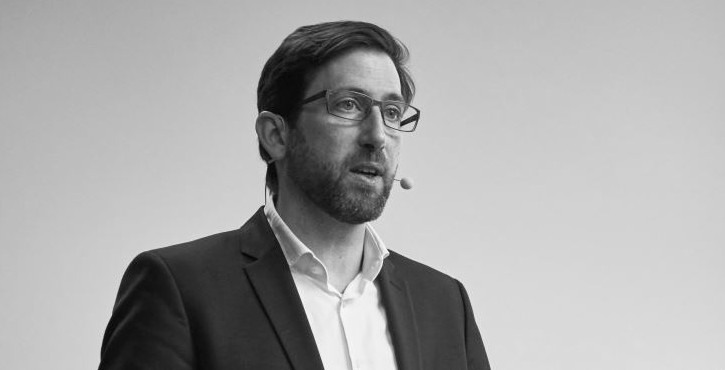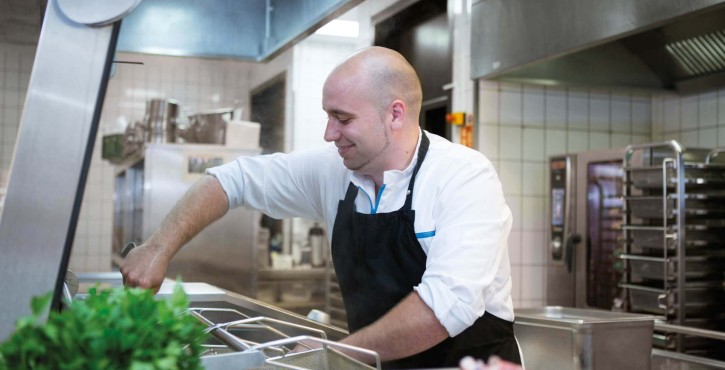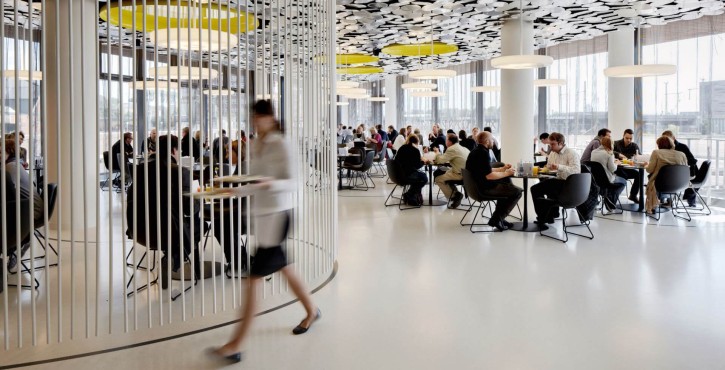News – 2022-05-19
The pandemic has permanently changed the way we work: People are now able to choose when to work according to their individual preferences rather than the framework conditions in their employment contract. But everyone appreciates a break after concentrated work in front of the computer, after a meeting and after time pressure. Now it’s time to refuel and develop new ideas. But what are the breaks now? And what does, for example, company catering have to do after such a paradigm shift? Which concepts could be suitable for the future? Oliver Feiler, Head of Market Intelligence at Rational, was on hand to answer questions.

Question:
As a futurologist at Rational, what do you think will come to corporate catering?
Feiler:
First things first: A lot has changed in our day-to-day work since the pandemic. Working hours are more flexible, face-to-face meetings with colleagues are no longer absolutely necessary and business trips will certainly not take place as often as before the pandemic. For corporate catering, this means that it must adapt to changed framework conditions.
Question:
What must corporate catering pay attention to in the future?
Feiler:
In my opinion, it is no longer just about catering for employees, but about contributing to the quality of their time in the company. The company restaurant expresses appreciation for employees and is the company's business card. If the needs of employees change, the company restaurant must also change. It’s practically a small food revolution within the company. In addition, the company restaurant is increasingly becoming a differentiating factor when recruiting new employees. It also serves to encourage people to return from their home office.

Question:
What direction can the new approaches take?
Feiler:
On the one hand, you can rethink the service: For example, individual home office services could be installed, snacks could be provided outside of lunchtime, external visitors could be allowed or a take-away service could be set up. To avoid food waste, the remaining food could be given out at half price after a certain time.
On the other hand, you can think about the design of the company restaurant: The spaces must become more attractive, multiple use is a must. For example, if they are only occupied for two to three hours over lunchtime, they can be opened at off-peak hours for meetings or work. Or even make it a place for socialising: the power of football has kept many in the office.
Question:
Are there already some examples?
Feiler:
In Silicon Valley, large IT companies have been enticing people with free meals for several years. The best-known example is certainly Google. At the Mountain View headquarters, there are 18 cafés with different concepts to choose from. But allowances for meals are also good form in many companies.
Question:
Have meal requests changed?
Feiler:
Because of the climate crisis and the pandemic, people are much more sensitive about what they eat. Meat consumption declines where this is actively supported. For example, the salad is in front, the meat behind. There are more and more questions about where food comes from. In addition to organic quality, regionality is increasingly in demand. Vegan and vegetarian are very popular, and recipes and preparation are changing accordingly.

Question:
How is food production changing?
Feiler:
In general, it can be said that food production must become much more flexible. They have different times, different foods and possibly special food for allergy sufferers. And then there are different distribution channels: direct serving, buffet, packaged to go or even from vending machines. And everything should be as fresh as possible.
Question:
And what about quality?
Feiler:
Nowadays, company restaurants are already being headed by Michelin-starred chefs. A classic win-win situation: The chef has regular working hours that are also compatible with family life. And the company restaurant can retain its employees in unprecedented quality.
Question:
Do you have a tip for corporate catering?
Feiler:
At Rational, of course, we only prepare all the food with our own cooking systems, the iCombi combi-steamer and the iVario, which can replace tilting pans, boiling pans and pressure cookers in corporate catering. Both cooking systems can produce large quantities – either a full load with the same food or a mixed load with very different foods, but which require the same cooking climate in the iCombi. Vegetables and stewed fish, for example, can be cooked together. Both cooking systems are very fast, so you can restock immediately and do not need to keep food warm. A big plus for quality. Both cooking systems are also able to deliver the same result every time. Regardless of whether the vegetables are fresh or frozen, for example. Then both of them automatically adjust to it.
Question:
Where do you see the future of the company restaurant?
Feiler:
Emergency solutions found during the crisis should be looked at with a new perspective. After all, it may be a new concept that is much more viable than originally thought. In my opinion, the company restaurant more than ever has the task of bringing employees back into the company and also to bind them to the company.
Thank you for talking to us, Oliver!